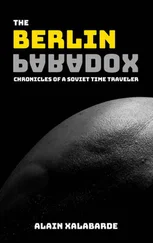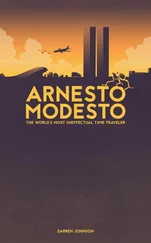James Gleick - Time Travel
Здесь есть возможность читать онлайн «James Gleick - Time Travel» — ознакомительный отрывок электронной книги совершенно бесплатно, а после прочтения отрывка купить полную версию. В некоторых случаях можно слушать аудио, скачать через торрент в формате fb2 и присутствует краткое содержание. Год выпуска: 2016, Издательство: Knopf Doubleday Publishing Group, Жанр: Старинная литература, на английском языке. Описание произведения, (предисловие) а так же отзывы посетителей доступны на портале библиотеки ЛибКат.
- Название:Time Travel
- Автор:
- Издательство:Knopf Doubleday Publishing Group
- Жанр:
- Год:2016
- ISBN:нет данных
- Рейтинг книги:5 / 5. Голосов: 1
-
Избранное:Добавить в избранное
- Отзывы:
-
Ваша оценка:
- 100
- 1
- 2
- 3
- 4
- 5
Time Travel: краткое содержание, описание и аннотация
Предлагаем к чтению аннотацию, описание, краткое содержание или предисловие (зависит от того, что написал сам автор книги «Time Travel»). Если вы не нашли необходимую информацию о книге — напишите в комментариях, мы постараемся отыскать её.
Time Travel — читать онлайн ознакомительный отрывок
Ниже представлен текст книги, разбитый по страницам. Система сохранения места последней прочитанной страницы, позволяет с удобством читать онлайн бесплатно книгу «Time Travel», без необходимости каждый раз заново искать на чём Вы остановились. Поставьте закладку, и сможете в любой момент перейти на страницу, на которой закончили чтение.
Интервал:
Закладка:
Would you accept the assertion that the cause of a rock is that same rock an instant earlier?
“All reasonings concerning matters of fact seem to be founded on the relation of Cause and Effect, ” said Hume, but he discovered that the reasonings were never easy or certain. Is the sun the cause of a rock’s warming? Is an insult the cause of a person’s anger? Only one thing could be said for sure: “A cause is an object followed by another.” If an effect doesn’t necessarily follow from a cause, was it a cause at all? The arguments echoed down the corridors of philosophy and continue to echo, despite Bertrand Russell’s attempt to settle the matter once and for all in 1913 with an appeal to modern science. “Oddly enough, in advanced sciences such as gravitational astronomy, the word ‘cause’ never occurs,” he wrote. Time for philosophers to get with the program. “The reason why physics has ceased to look for causes is that, in fact, there are no such things. The law of causality, I believe, like much that passes muster among philosophers, is a relic of a bygone age, surviving, like the monarchy, only because it is erroneously supposed to do no harm.”
Russell had in mind the hyper-Newtonian view of science described a century earlier by Laplace—the Universe Rigid—in which all that exists is locked together in a machinery of physical laws. Laplace spoke of the past as the cause of the future, but if the whole machine chugs along in lockstep, why should we imagine any particular gear or lever to be more causal than any other piece? We may consider the horse to be the cause of the carriage’s motion, but that is mere prejudice. Like it or not, the horse, too, is fully determined. Russell had noticed that when physicists write down their laws in mathematical language, time has no inherent directionality. “The law makes no difference between past and future,” he wrote. “The future ‘determines’ the past in exactly the same sense in which the past ‘determines’ the future.”
“But,” we are told, “you cannot alter the past, while you can to some extent alter the future.” This view seems to me to rest upon just those errors in regard to causation which it has been my object to remove. You cannot make the past other than it was—true….If you already know what the past was, obviously it is useless to wish it different. But also you cannot make the future other than it will be….If you happen to know the future—e.g. in the case of a forthcoming eclipse—it is just as useless to wish it different as to wish the past different.
And yet, Russell notwithstanding, scientists can no more abandon causation than anyone else. Cigarette smoking causes cancer, whether or not any particular cigarette causes any particular cancer. The burning of oil and coal in the air causes climate change. A mutation in a single gene causes phenylketonuria. The collapse of a burned-out star causes a supernova. Hume was right: “All reasonings concerning matters of fact seem to be founded on the relation of Cause and Effect.” Sometimes it’s all we talk about. The lines of causality are everywhere, some short and some long, some firm and others tenuous, invisible, interwoven, and inescapable. They all run in one direction, from past to future.
Let’s say that one day in 1811, in the town of Teplice, northwestern Bohemia, a man named Ludwig inks a note on a stave in his sketchbook. On an evening in 2011, a woman named Rachel blows a horn in Boston Symphony Hall, with a measurable effect: the air in that room vibrates with a predominant wavelength of 444 cycles per second. Who can deny that, at least in part, the note on paper caused the atmospheric vibrations two centuries later? Using the laws of physics, the path of influence from those molecules in Bohemia to the molecules in Boston would be challenging to compute, even given Laplace’s mythical “intelligence which could comprehend all the forces.” Yet we can see an unbroken causal chain. A chain of information, if not matter.
Russell did not end the conversation when he declared notions of causality to be relics of a bygone age. Not only do philosophers and physicists continue to wrangle over cause and effect, they add new possibilities to the mix. Retrocausation is now a topic: also known as backward causation or retro-chronal causation. Michael Dummett, a distinguished English logician and philosopher (and reader of science fiction), seems to have given this branch its start with his 1954 paper, “Can an Effect Precede Its Cause?” followed ten years later with his less tentative “Bringing About the Past.” Among the questions he raised was this. Suppose he hears on the radio that his son’s ship has sunk in the Atlantic. He prays to God that his son should be among the survivors. Has he blasphemed by asking God to undo what has been done? Or is this prayer functionally identical to praying in advance for his son’s safe passage?
What might inspire modern philosophers, against all precedent and tradition, to consider the possibility that effects might precede causes? The Stanford Encyclopedia of Philosophy offers this answer: “Time Travel.” Indeed, all the time-travel paradoxes, births and murders alike, stem from retrocausality. Effects undo their causes.
The first main argument against the causal order being the temporal order is that temporally backwards causation is possible in cases such as time travel. It seems metaphysically possible that a time traveler enters a time machine at time t 1, thus causing her to exit the time machine at some earlier time t 0 . Indeed, this looks to be nomologically possible, since Gödel has proved that there are solutions to Einstein’s field equations that permit looping pathways.
Not that time travel settles the matter. “A variety of incoherencies might be alleged here,” the encyclopedia cautions, “including the incoherency of changing what is already fixed (causing the past), of being both able and unable to kill one’s own ancestors, or of generating a causal loop.” Brave writers are willing to risk an incoherency or two. Philip K. Dick ran the clocks backward (as it were) in Counter-Clock World, and so did Martin Amis in Time’s Arrow.
We do seem to be traveling in circles.
—
“THE RECENT RENAISSANCE of wormhole physics has led to a very disturbing observation,” wrote Matt Visser, a mathematician and cosmologist in New Zealand in 1994 in Nuclear Physics B (the forking path of Nuclear Physics devoted to “theoretical, phenomenological, and experimental high energy physics, quantum field theory and statistical systems”). Evidently the “renaissance” of wormhole physics was well established, though these supposed tunnels through spacetime remained (and remain) entirely hypothetical. The disturbing observation was this: “If traversable wormholes exist then it appears to be rather easy to transform such wormholes into time machines.” It was not just disturbing. It was extremely disturbing: “This extremely disturbing state of affairs has led Hawking to promulgate his chronology protection conjecture.”
Hawking is, of course, Stephen Hawking, the Cambridge physicist who by then had become the world’s most famous living scientist, in part because of his dramatic decades-long struggle with an inexorably paralyzing motor neuron disease and in part because of his flair for popularizing the knottiest problems of cosmology. No wonder he was attracted to time travel.
“Chronology Protection Conjecture” was the title of a paper he wrote in 1991 for Physical Review D. He explained the motivation as follows: “It has been suggested that an advanced civilization might have the technology to warp spacetime so that closed timelike curves would appear, allowing travel into the past.” Suggested by whom? An army of science-fiction writers, of course, but Hawking cited the physicist Kip Thorne (yet another Wheeler protégé) of the California Institute of Technology, who had been working with his graduate students on “wormholes and time machines.”
Читать дальшеИнтервал:
Закладка:
Похожие книги на «Time Travel»
Представляем Вашему вниманию похожие книги на «Time Travel» списком для выбора. Мы отобрали схожую по названию и смыслу литературу в надежде предоставить читателям больше вариантов отыскать новые, интересные, ещё непрочитанные произведения.
Обсуждение, отзывы о книге «Time Travel» и просто собственные мнения читателей. Оставьте ваши комментарии, напишите, что Вы думаете о произведении, его смысле или главных героях. Укажите что конкретно понравилось, а что нет, и почему Вы так считаете.












